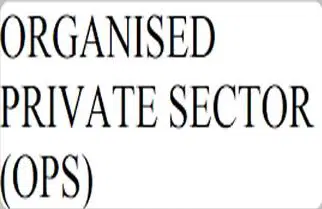With the US Senate having approved W h i t e House’s request to cancel $9.4 billion in federal spending on foreign aid, members of Nigeria’s Organised Private Sector (OPS), have pinpointed that the move would result in Africa countries, including Nigeria, struggling for funding interventions in certain areas of their key sectors, mostly healthcare.
Specifically, the private sector group explained that the US Congress approving President Donald Trump’s request to cancel $9.4 billion in federal spending on foreign aid will bring about abruptly financing gaps for Nigeria’s health sector, saying President Bola Tinubu’s administration must give additional budget allocation to the Federal Ministry of Health (FMH), in addition to the allocated N2.48 trillion to the healthcare sector in the 2025 budget, which represented 5.18 per cent of the total N47.9 trillion budget.
The private sector group comprises business membership organisations, such as: Manufacturers Association of Nigeria (MAN), Nigerian Association of Chambers of Commerce, Industries, Mines and Agriculture (NACCIMA), Lagos Chamber of Commerce and Industry (LCCI), Nigeria Employers Consultative Association (NECA), the Nigerian Association of Small and Medium Enterprises (NASME), Nigerian Association of Small Scale Industrialists (NASSI), and Centre for the Promotion of Private Enterprise (CPPE).
It pointed out that the US government’s outright cancellation of foreign aid intervention has put to rest the winding up of its Agency for International Development (USAID).
Speaking in an interview with New Telegraph on the OPS’s reaction to cancellation of the $9.4 billion in federal spending on foreign aid in Lagos yesterday, the Director/ Chief Executive Officer (CEO), Centre for the Promotion of Private Enterprise (CPPE), Dr Muda Yusuf, said that funding shortfall should be expected to hit key sectors of the economy, mostly the healthcare industry, where USAID has been playing key role in terms of funding interventions.
In addition, Yusuf gave kudos to the Minister of Health and Social Welfare, Prof Muhammad Ali Pate, for working round the clock since Donald Trump broke the news of his intention to ban USAID and other US agencies involved in foreign aid.
The CPPE CEO said: “The US Senate approval of the White House’s request to cancel $9.4 billion in federal spending on foreign aid is going to cause a strong financing gap in mostly key sectors of Nigeria’s economy, especially the health sector.
You know USAID has a very strong impact in the area of health sector, like, HIV, AIDS, cancer and others. So a lot of funding interventions we have been receiving on that sector will be abruptly stopped, and the impact will be pronounced.
But I am sure USAID also have other interventions in some other areas of key sectors in our economy.”
On what Nigeria is doing, Yusuf stated: “You know that President Trump has announced this before now; it is just that the stopping of the foreign aid is now being approved by the US Congress.
At that time, they had even stopped it abruptly and our Minister of Health and Social Welfare has been very proactive.
I think immediately, he made recommendations to the President, to the National Assembly for some adjustment to be made in the 2025 budget to be able to make up for the gap that will be created from the continuation of Trump’s foreign aids.
“So, on the home front, in terms of what the government of Nigeria can do: there have been some proactive steps taken by government to ensure that those gaps don’t create too much disruption in our health delivery system.”
On the multiplier effects on WHO, the economist said: “It is going to affect them too and I think Trump has even spoken about either withdrawing completely from WHO or scaling down their funding so it is going to significantly affect WHO.
But the good thing about Nigeria is that we are not too dependent on WHO like many other African countries.















